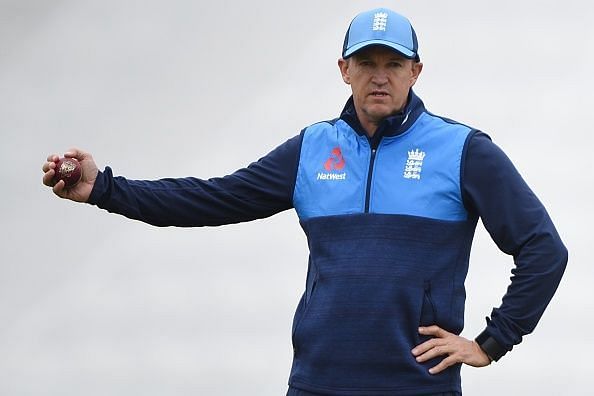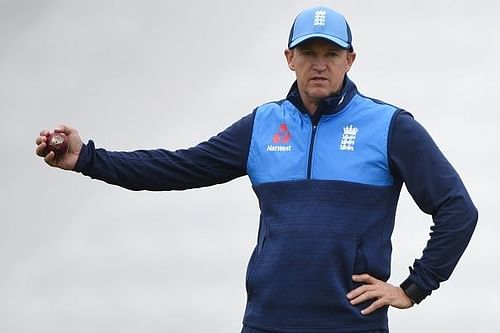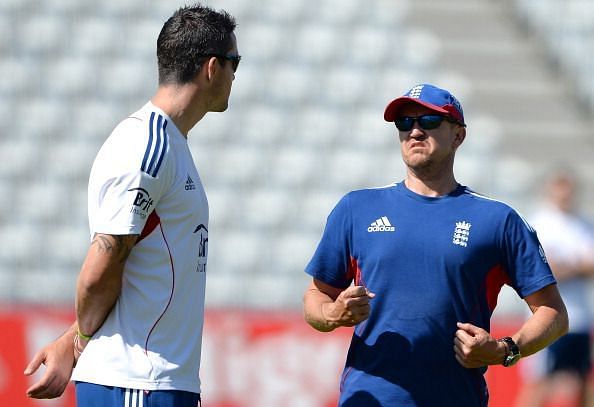
Under the SKanner: Andy Flower

As a star-studded World XI team is gearing up to bring international cricket back to Pakistan, one name has gone under the radar. Even as high-profile names such as captain Faf du Plessis and batting stalwart Hashim Amla have mostly hogged the attention, the motley crew's coach has preferred to stay in the background. Andy Flower, who had a productive stint with the England team, will seek to bring a heterogeneous group of players on the same page.
Since taking control of the England side as Team Director during April 2009, Flower oversaw a memorable period which marked a gloried chapter as a plethora of talented cricketers were juxtaposed into a formidable unit. Apart from the 2010 World T20 triumph (incidentally England's only success in ICC events), the former Zimbabwean captain coached a determined unit to the top of the Test rankings as well as home and away Ashes glory.
Let us take a look at all the key factors which have embodied the coaching prowess of Flower. While his strengths were manifold, his weaknesses eventually proved to be his undoing as a 0-5 Ashes drubbing brought his England stint to an abrupt halt in the 2013/14 season.
Strengths
Experience as a player and captain

Having represented Zimbabwe in 63 Tests and 213 ODIs, Flower has been able to rely on his immense playing experience and approach the coaching role from a different perspective. His two captaincy stints, wherein the left-hander met the challenges of leading an aspiring nation, have ensured that he backs his players to the hilt even if their performances do not necessarily meet his demands.
A Test average of 51.54 remains quite indicative of Flower's expertise with the bat. Due to the fact that he donned the wicket-keeper gloves, he usually got the best vantage position in the field and subsequently gained extensive knowledge on tackling different situations in the game. As a result, he has managed to develop a sound intellect with strong match awareness. These are important coaching qualities that can rub off on impressionable players.
Capable of instilling a winning mentality
When Peter Moores left the scene, England desperately needed a coach who could combine strong analytical skills with a certain degree of flexibility. With the likes of Andrew Strauss, Kevin Pietersen, James Anderson, Stuart Broad and Graeme Swann growing into senior members, the requirement of the hour was someone who would bolster the team by bringing a cutting edge to the set-up.
Upon finding a suitable ally in Strauss, Flower began instilling a ruthless attitude into the group and enhanced their competitiveness by constantly setting high standards. For a team, whose fulcrum was in peak condition, there were imperative facets.
Understanding the modern game
Flower's greatest strengths include a profound understanding of the modern game. Acknowledging the opportunity at hand, he ensured that the England players were mostly in the attacking frame of mind. This aspect can be discerned from the team's 4-0 whitewash of India during the 2011 home summer. While the Pataudi Trophy paved the way for his team to displace an experienced Indian side at the top of the Test rankings, the series also highlighted Flower's ability to weed out England's traditional safety-first approach. Even though the conditions were in their favour, Strauss's team captured everyone's attention by playing an eye-catching brand of cricket.
Weaknesses
Inability to handle mercurial stars

Even though the capacity to chart strategies and plot opponents' downfall are integral to the role of head coach, the importance of man-management can never be understated. The players, who rule the roost at the international level, sometimes tend to lose sight of the big picture and create a halo around themselves. As they are often volatile, these mercurial stars have to be handled differently than the rest of the guys in the dressing room.
While Flower's non-compromising rigidity may have brought a sense of purpose to the national set-up, his unflinching adherence to the one-size-fits-all philosophy resulted in a major meltdown in the dressing room. Even as they were being battered into submission by a rejuvenated Australian outfit, England's dressing room atmosphere disintegrated sharply under the Zimbabwean's watch.
With Strauss no longer at the helm of affairs, Flower was unable to build a similar relationship with an inexperienced and measured captain in Alastair Cook. Pietersen alleged that the coach had created a culture of 'fear' in the dressing room and went on to insist that the erstwhile southpaw always had it in for him. More pertinently, he called the set-up as a 'regime' and not as a team. This incident may speak for Pietersen's combustible nature but there's no denying that Flower failed at handling one of England's most talented stroke-makers in recent times.
Vulnerable to adversity
The significance of the head coach's role has been one of the most debated and scrutinised subjects in the modern era. Even though the players, as well as captain, deserve both plaudits and brickbats for the team's on-field performance, a level-headed and strong-willed coach is also instrumental in ensuring that the focus never veers away from the objective. In this regard, Flower has been thoroughly tested. While his coaching resume looked glittering when the experienced names were at the peak of their powers, flailing limbs and exhausted minds conspired to place a question mark over his propensity to motivate a despondent unit.
The 2012 series against Pakistan at the UAE subjected England's temperament to a stern test. Despite the 0-3 hammering serving as a launchpad for the team's subsequent conquest of India, Flower's position began to fall on shaky ground. His ineffectiveness at revamping the team's white-ball game was exacerbated by a paradigm shift within English cricket. Ultimately, the ramifications stemming from the side's humiliation in the 2013/14 Ashes forced him to step down from the position. Since then, he has worked with England & Wales Cricket Board (ECB) in different capacities.